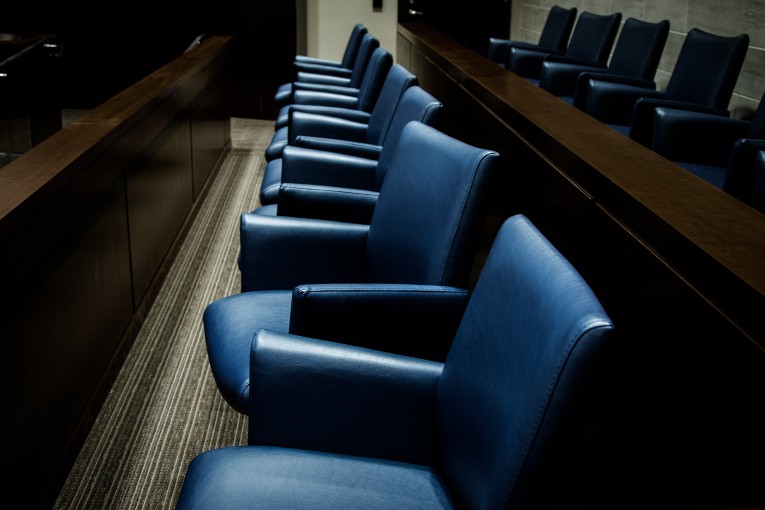
 By Sophie Marconi and Ribhu Singh
By Sophie Marconi and Ribhu Singh
On July 13, 2016, at approximately 2 pm in Department 10, Joshua Matthew Savage was convicted of three out of the five charges against him, including driving under the influence of alcohol, driving at a blood alcohol level of .08 or above, and driving with a suspended or revoked license. All of the charges that Joshua Savage was convicted of were misdemeanors.
On the felony charges of theft or unauthorized use of a vehicle and knowingly purchasing or receiving a stolen vehicle, Joshua Savage was found not guilty. Mr. Savage has a prior DUI charge that took place in 2007, leading him to submit a plea form.
Mr. Savage has been in custody for 65 days, and because of this Judge Daniel Maguire significantly reduced Mr. Savage’s fees and fines to $1,800 and allowed monthly payments. Judge Maguire decided to impose the SCRAM (a scenario-based alcohol monitoring system) requirement because of the conditions of the charges Mr. Savage was convicted of, but he provided Mr. Savage with an earlier review date, three months out instead of six months.
Judge Maguire also assigned Mr. Savage with four years probation, as well as 30 days in jail. Mr. Savage is also required to abstain from drinking for the four years of his probation, complete a nine-month DUI class, and maintain his SCRAM requirement for two years. Joshua Savage is assigned to return to court on October 18, 2016, for his three-month SCRAM review.
The jury in the trial of Joshua Savage was asked to render a verdict today after the District Attorney’s office and the Public Defender’s office summarized their cases in their closing arguments. Judge Maguire instructed the jury on the burdens of proof to be met in regard to the evidence in the case, and also reminded the jurors of their obligation to find Mr. Savage guilty beyond a reasonable doubt.
The principal charge levied against Mr. Savage was the unlawful operation of a stolen automobile. In addition to this, Mr. Savage was also charged with operating an automobile under the influence, and operating a vehicle with an expired license.
The prosecution was the first to address the jury during closing arguments. The prosecutor assured the jury that the case in question was “ fairly straightforward” and that the evidence unequivocally established that Mr. Savage had been operating the vehicle while he was under the influence of alcohol.
The prosecutor conceded that there was no “direct evidence for what [was] in [Mr. Savage’s] mind,” but stated that there was sufficient evidence to establish criminal intent based on Mr. Savage’s statements during arrest. The prosecutor asserted that Mr. Savage’s statement, “I knew it was too good to be true,” was constitutive of intent and implored the jury to find Mr. Savage guilty on all five charges.
The defense prefaced her statements with a reminder of the constitutive elements of reasonable doubt. The defense acknowledged that there was sufficient evidence to establish that Mr. Savage had been driving drunk, but adamantly denied that Mr. Savage had knowingly driven a stolen car.
The defense asserted that Mr. Savage’s statements regarding his admission of knowing “it was too good to be true” were an example of “hindsight bias,” and that Mr. Savage had not “been out looking for crime.” The defense proffered that Mr. Savage had made poor choices, but argued that his actions were unintentional and were the result of his not “choos[ing] his friends wisely.”
The defense stated that the prosecution had not met its burden of proving criminal intent for the theft of the car, and that there had been “almost no investigation” into the matter. The defense implored the jury to “hold the prosecution to their burden,” and then concluded by stating to the jury that “if there was not enough evidence you must find [the defendant] not guilty.”

Ah so the “too drunk to comprehend the vehicle he was driving had been stolen defense” worked.
As I understand the issue, the owner lent the car to someone who lent the car to the defendant. Thus the defendant had legitimate reason to believe that he had permission to use the car.
Okay, I can believe that story. Why didn’t his lawyer just go with that instead of the too drunk defense?
I wasn’t there, so it’s hard to say.
BP
“Why didn’t his lawyer just go with that instead of the too drunk defense?”
Why would that matter ? In our system, it is up to the prosecution to prove guilt beyond a reasonable doubt. If there is a reasonable doubt, the jury must find for innocence regardless of who has introduced the reasonable doubt be that the defendant, a lawyer, or another juror.
Because the too drunk defense seemed stupid where what David laid out came across as reasonable.
Thanks to the “V” for posting the verdict of this trial. We often hear of and follow cases on here but never know the outcomes.
Yes, I regularly borrow friends cars when I don’t have a license and am drunk. They usually give me either a set of shaved down keys or a screwdriver to start their cars.
You have more interesting friends than I do. Mine just hand me a set of jumper cables.
Vehicle theft requires intent to steal